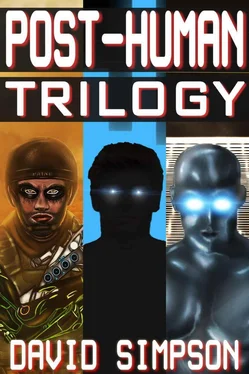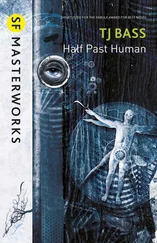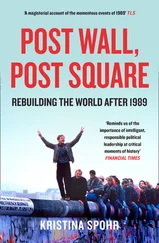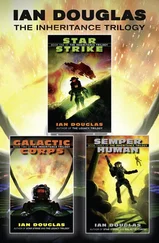“Sir?”
“I’ve just read the most recent evaluation of the artificial intelligence extraction project. According to the project leader, it may take weeks or even a month to extract the A.I., and even then, there is no guarantee that Emilson will survive the procedure.”
Colonel Paine sighed. “I hadn’t read the report.”
“No, you couldn’t have. It was written specifically for me—hot off the presses, so to speak. Evidently, the project leader expects that the A.I. will be able to execute evasive maneuvers to prolong the process, playing hide-and-seek inside the poor man’s body. She thinks there may be ways to isolate it, but attempts at keeping Emilson alive increase the chances that the A.I.’s mother program may be damaged. It is a risk we simply can’t take to spare the life of one man, Colonel, no matter how heroic he might be.”
“Can we give her some time—”
“Time is unfortunately a luxury we cannot afford,” Morgan replied. “You know the score, Colonel. That A.I. is the most valuable entity in the world. It can be the answer to all of our problems. Every moment that it eludes us is another moment for another A.I.— a hostile A.I.—to emerge unchallenged. Keeping Emilson alive means gambling with the safety of our entire species and, Colonel, you know me well enough to know I won’t take that gamble.”
“I do, Mr. President. I understand.”
“Colonel, it is my understanding that this Emilson is combative, that he’s actually trying to guard the A.I. I’ll give you an opportunity to talk to him. Perhaps if he knew the real reason we want the mother program—if he understood our plans for it—then you might be able to reason with him. You may even be able to reason with the A.I. inside him. Maybe you can convince them to separate willingly. What do you think?”
“I think it’s worth a shot, Mr. President. If that doesn’t work, I’ll instruct the removal team to extract the A.I. using any means necessary.”
“Excellent, Colonel. Excellent. Thank you.”
“Are you working on a plan to get us out of here?” Craig asked the A.I.
“I’m afraid escape is currently unachievable. Without your MTF generator, there’s no way to overcome your bindings, which have an electronic locking mechanism.”
“That’s not very encouraging,” Craig replied in a low tone.
“I’m sorry, Craig, but it appears we will need the introduction of new elements in the scenario before we can execute a viable escape plan. In the meantime, the one thing I can do is thwart the Purist extraction team’s attempts to separate the nans that carry my mother program from your neurons. This will buy us more time.”
“Okay. I guess we keep our eyes peeled then.”
“Yes.”
A moment later, the door to the room opened, and Colonel Paine entered, wearing his uniform cap low over his prosthetic eyes, with his head bowed. In tow, a man Craig didn’t recognize was at Paine’s heels, a look of uncertainty on his face.
“That is Professor Sanha Cho,” the A.I. informed Craig.
“Ah,” Craig replied. “Thanks.”
Paine looked up and followed Craig’s eye line to Sanha. “Heh. I guess I don’t have to introduce you then.”
“Got it covered,” Craig replied.
Paine nodded. He placed his hands on his hips and turned away for a moment, staring off into the dark corners of the room, mulling over his thoughts. Craig could have sworn that Paine seemed depressed. “Can you keep a secret, Doc?”
“Sure.”
“I’m not long for this world, as they say.” Paine stepped forward and removed his cap, and it quickly became apparent why he’d been wearing it low. His face was so pallid that he appeared like a corpse, and his hair was beginning to fall out in clumps—a feature he demonstrated by rubbing his mechanical hand over his scalp, causing the salt-and-pepper hair to rain down onto the ground.
“He’s suffered a lethal dose of radiation,” the A.I. quickly noted.
“That fallout in Shenzhen was a real bitch,” Paine said, taking a crack at dark humor. He didn’t smile, however, and the golden irises on his ocular implants seemed even more lifeless than usual.
“With symptoms this pervasive already, he’ll be dead within days if he doesn’t get medical treatment beyond Purist capability. I’d say he’s mere hours away from being bedridden.”
“Ironic,” Craig observed.
“What is?” Paine asked. “That I’m dying?”
“That the technology you’ve fought against is the only technology that can save you.”
Paine sighed, placing his hand across his abdomen to soothe the twisting muscles in his midsection. “I’m not against technology, Doc.” He held up his cybernetic arm as evidence, then pointed with its mechanical finger to his computerized eyes. “ Obviously . However, I am against threats to the survival of our species.”
“Then you should have no problem using nans like the ones inside of me,” Craig replied. “If you weren’t a murderous piece of garbage, I’d have my A.I. whip up a batch for you. You’d be right as rain in no time.”
Paine stood, frozen. His tongue pressed against one of his molars, which was beginning to come loose; he tasted salty blood oozing from his gums. It wasn’t easy falling apart. “I really wish you didn’t feel that way, Doc. There are things you haven’t considered. For instance, that nanobots of the sophistication that you have inside you are dangerous.”
“Really?” Craig scoffed. “I was exposed to the radiation in Shenzhen even longer than you were, but I’m fine. The nans are okay in my books.”
“Sure, for now, but have you had the time to consider what nanobots could do if they form a large enough network? They communicate with one another, right?” Paine pointed briefly to Craig’s skull. “They’re just like the neurons in your brain. One neuron doesn’t do a whole lot. Hell, you can kill a bunch of ‘em with a night of hard drinking and not be much worse for wear in a couple of days. But get 120 billion of those little suckers together, and it makes you you—a consciousness . Nanobots like the ones the post-humans were recklessly using—like the ones inside of you now—are a hell of a lot more sophisticated than a neuron. Imagine if they formed a consciousness—a consciousness whose motives we’d never be able to predict. Nah, Doc. I’m no hypocrite. I’ll die before I put untested technology like that inside me.”
“You’d be afraid of your own shadow if someone told you Aldous Gibson invented it.”
Paine managed a faintly amused grin, but it melted when he briefly considered that it might be his last. “You know, Doc, I think you’re right about that. I’d think twice about anything that Gibson created, which brings me to my reason for this chat.” Paine held out one of his cybernetic arms and gestured toward Sanha. “Your A.I. has already told you that this is Professor Sanha Cho, a former post-human. What your A.I. hasn’t told you—what it didn’t know—what I didn’t even know until twenty minutes ago—is that Professor Cho is the one who gave us the location to the post-human facility.”
“He’s right,” the A.I. said, his voice tinged with surprise. “This is entirely unexpected.”
“So he’s a traitor,” Craig observed. “So what?”
“Not a traitor,” Sanha replied defensively. “A man that was willing to give up everything for a chance at peace.”
“Give up everything?” Craig responded. “That’s funny, considering you’re the only post-human who’s still alive. Seems like you’re the only one who didn’t give up a damn thing.”
Sanha looked up apprehensively at Colonel Paine, like an abused animal seeking its owner’s permission to step away from its leash.
Читать дальше












